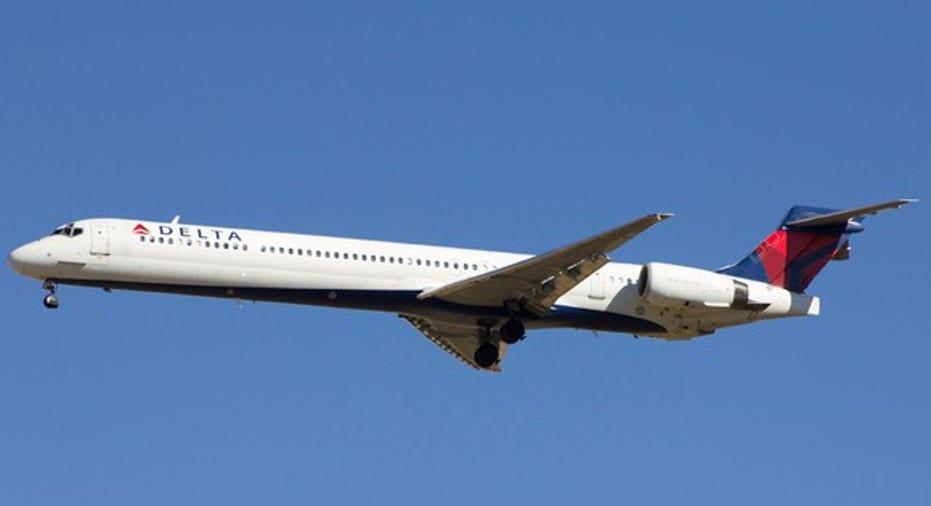Delta Air Lines, Inc. Earnings: A Disappointing Summer

Image source: The Motley Fool.
Summer is the peak season for airlines in North America. Traditionally, it's when airlines pull in their biggest quarterly profits of the year.
Not surprisingly, Delta Air Lines (NYSE: DAL) reported on Thursday morning that it earned a hefty profit last quarter. However, considering that it continued to benefit from falling fuel prices and steady (if not spectacular) economic growth, Delta's Q3 results were hardly inspiring.
Delta's earnings by the numbers
Delta's revenue fell 5.6% year over year last quarter to $10.48 billion, despite a modest increase in capacity. That included nearly 2 percentage points in negative impacts from Delta's August technology outage and lower yen hedging gains. Nearly every other important financial metric moved in the wrong direction, too.
Data source: Delta Air Lines Q3 earnings release.
Delta did a good job of holding non-fuel unit costs roughly flat last quarter. Furthermore, its adjusted fuel price fell to $1.48/gallon from $1.80/gallon a year earlier, providing hundreds of millions of dollars of savings.
However, this was not enough to offset Delta's 6.8% decline in passenger revenue per available seat mile (PRASM). As a result, pre-tax income declined by $278 million year over year. Despite a lower tax rate and a lower share count, Delta's adjusted earnings per share slipped to $1.70 from $1.74 a year earlier.
Furthermore, Delta's Q3 earnings performance would have been even worse had the company not settled all of its fuel hedging losses for 2016 during the previous quarter. That pulled forward $455 million of hedging losses into Q2, some of which would otherwise have been incurred last quarter.
That said, it's important to recognize that Delta's Q3 pre-tax margin of more than 18% should put it solidly in the upper half of the industry. It's only a disappointment relative to the company's stellar 2015 performance.
Revenue stays weak in Delta's biggest markets
Delta's year-over-year earnings decline was driven by a continuation of weak revenue trends across much of the globe. Like its peers, Delta reports revenue for four geographic regions: domestic, transatlantic, transpacific, and Latin America. Of those four regions, PRASM grew year over year in only one: Latin America.
Unfortunately, Latin America is the least important region for Delta, contributing a little over 6% of its revenue. Delta's 1.4% year-over-year PRASM growth there thus did little to offset its sharp PRASM declines of at least 7% in each of the other three geographic regions.
Looking ahead
For Q4, Delta expects PRASM to decline 3% to 5% year over year. As a result, management forecast a Q4 operating margin of 14% to 16%. That would translate to a pre-tax margin of approximately 13% to 15%, down slightly from 15.2% in Q4 2015.
One important caveat is that Delta's guidance does not incorporate any impact from the tentative agreement Delta recently reached with its pilots. Since the pilot deal provides an 18% pay raise retroactive to the beginning of 2016, it would push Delta's Q4 costs significantly higher if it is ratified, weighing on margins.
With Delta's profit margin starting to decline, management has become even more determined to get unit revenue growing again. Delta CEO Ed Bastian stated that the company will target capacity growth of just 1% in 2017. With year-over-year comparisons getting easier and credit card revenue expected to rise in 2017, Delta has a good chance of returning to unit revenue growth within the next few quarters.
A secret billion-dollar stock opportunity The world's biggest tech company forgot to show you something, but a few Wall Street analysts and the Fool didn't miss a beat: There's a small company that's powering their brand-new gadgets and the coming revolution in technology. And we think its stock price has nearly unlimited room to run for early in-the-know investors! To be one of them, just click here.
Adam Levine-Weinberg is long January 2017 $40 calls on Delta Air Lines. The Motley Fool has no position in any of the stocks mentioned. Try any of our Foolish newsletter services free for 30 days. We Fools may not all hold the same opinions, but we all believe that considering a diverse range of insights makes us better investors. The Motley Fool has a disclosure policy.



















